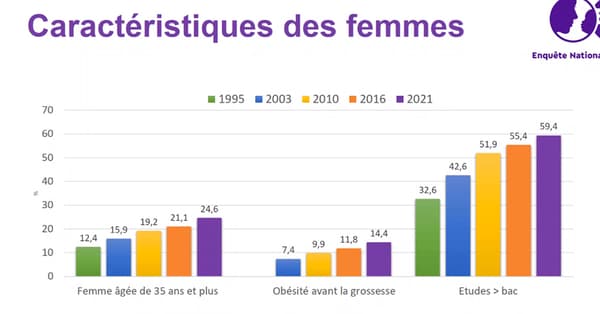How are mothers in 2021? A new national perinatal survey published this Thursday and conducted by Inserm and Public Health France analyzes their demographic and social characteristics, as well as their state of physical and mental health during pregnancy, at the time of delivery and two months later.
This inventory, carried out among 13,404 women in March 2021, confirms long-term trends and shows, in particular, that young mothers are, on average, older, more often overweight, but better medically controlled. Emphasis was also placed for the first time on the study of his mental health.

• A quarter of mothers give birth after the age of 35
The first great lesson of the study carried out every 5 years, mothers are getting older at the time of childbirth: one in four women who give birth in France, not necessarily for the first time, is over 35 years old.
In fact, the proportion of women aged 35 to 39 at the time of delivery and aged 40 and over has been increasing since 2016 (19.1% in 2021 vs. 17.2% in 2016, and 5.4% in 2021 vs. 3.9%, respectively).
The trend toward higher childbearing age is worrisome because the risks to mother and child increase significantly with a woman’s age.
• More overweight mothers, but fewer cases of addiction
Another important trend that continues: mothers are becoming more overweight or obese. A “worrying” increase, underlines the study.
In 2021, 23% of women were overweight compared to 19.9% in 2016 and more than 14% were obese in 2021 compared to 11.8% in 2016.
“These are factors that are often associated with complications during pregnancy,” recalls Camille Le Ray, gynecologist-obstetrician, epidemiologist at Inserm, during a press conference.
Good news, however, in terms of addiction, women are less likely to report tobacco use during the third trimester of pregnancy (from 16.3% in 2016 to 12.2% in 2021). Same trend for cannabis (from 2.1% to 1.1%).
• An increasing level of study
In addition to medical conditions, the study is interested in the sociological data of the mothers questioned. Thus, it shows that more and more pregnant women have followed long studies.
The proportion of expectant mothers with higher education than high school went from 42.8% in 2003 to 52.1% in 2010, then to 55.4% in 2016 and 59.4% in 2021.
• More than 16% have a depressive state two months after giving birth
For the first time since the start of this survey, a two-month follow-up also allowed the women’s mental health to be assessed. It shows that 16.7% of mothers present major depressive symptoms two months after giving birth.
The study specifies that it is not possible to determine whether or not this situation is linked to the general deterioration of the mental health of the population with the Covid-19 pandemic.
Since July 1, in this context, an early postnatal interview has been made mandatory for young mothers. Intended to identify the first signs of discomfort very early, this measure has been recommended since 2014 by the High Health Authority (HAS).
The proportion of women who consulted a health professional for psychological difficulties during pregnancy is also increasing (from 6.4% to 8.9%).
• 1 in 10 women mentions inappropriate words or actions by caregivers
Another novelty of this study collected the feelings of women about the care received during this period of their lives. And about 10% report being exposed sometimes or often during their pregnancy, childbirth or maternity ward stay to inappropriate words or attitudes by caregivers, and about 7% to inappropriate gestures.
In addition, 15.5% of women say they have had a difficult or very difficult time during their pregnancy and 11.7% have a bad or very bad experience during their delivery.
When asked about their satisfaction two months after childbirth, more than 90% of women say they are satisfied or even very satisfied with the medical care during the follow-up of their pregnancy and delivery. Almost 8 out of 10 women say they have received a home visit from a midwife after giving birth.
Source: BFM TV

